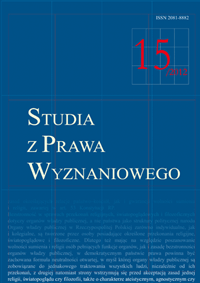Przystosowanie i opór żeńskich zgromadzeń zakonnych wobec władz komunistycznych w Polsce. Zarys problemu
Nuns’ participation and their role in creating an anti-communism attitude of resistance in People’s Republic of Poland
Author(s): Agata MirekSubject(s): Law, Constitution, Jurisprudence
Published by: Katolicki Uniwersytet Lubelski Jana Pawła II - Wydział Prawa, Prawa Kanonicznego i Administracji
Keywords: Communist regime; totalitarianism; atheisation; anti-communist resistance; the church; congregations, nuns
Summary/Abstract: From 1944 when Poland was under the communism rule two kind of attitudes existed in polish society – adaptation and resistance. Affirmation, adjustment, resistance and opposition – those attitudes were appearing at the same time and were related to each other. Anti-communist resistance in People’s Republic of Poland applied to every class and group of society. The resistance was especially directed into a restrict feature limiting a freedom to profess religion, damaging a value of national tradition or limiting a freedom to speech and beliefs. In August 1949 “ A decree of protection of freedom of conscience and denomination” was issued. Technically this document, was meant to create a lawful guarantee of freedom of denominations in Poland. In reality some of the regulations were used by the different authorities to both make Church’s life more difficult and to repress clergy and secular people. The Catholics in Poland were treated as a second category citizens ( limited with their capability to get promotion, even if they kept a loyal attitudes) but nuns were treated even worst as a third category citizens, being continuously pushing to the dregs of social live, without not only any chance to get promotion but also without the fundamental rights and freedom guarantee to every Poles by the Constitution. In further perspective the communist government planned to gradually limited congregations work, created closed enclaves and aimed to completely liquidate nuns work. The right person for the Church happened to be a cardinal Stefan Wyszyński a Primate of Poland. Thanks to an inflexible attitudes of cardinal Wyszyński and his Non possumus the authorities were unable to fulfill the program of “loyality” in Catholic Church in Poland. The Primate tried to show nuns a new perspective of work and was looking for methods to defend and kept monastic life in Poland. The Episcopal was protecting monastic live. It was aware that battle with religious orders was a part of a main repertoire among most of the regime which at any time undertake a battle with Church. The history of People’s Republic of Poland might be describe as a process of struggle between the authorities and society where both sides were changing under influence of this struggle.
Journal: Studia z Prawa Wyznaniowego
- Issue Year: 2012
- Issue No: 15
- Page Range: 217-233
- Page Count: 17
- Language: Polish

